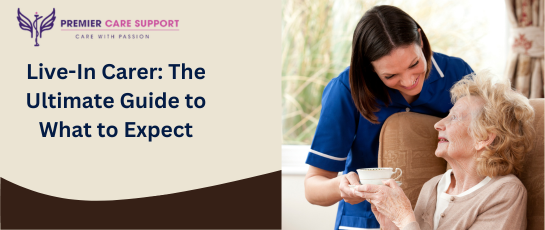Live-In Carer: The Ultimate Guide to What to Expect
When hiring a live-in carer in the UK, you can expect a range of services and support tailored to the specific needs of the person receiving care.
At Premier Care Support, our live-in carers provide comprehensive assistance to individuals who may have physical disabilities, medical conditions, or require support with daily living activities. Here are some key expectations:

1. Personal Care: Live-in carers assist with personal hygiene tasks, including bathing, grooming, toileting, and dressing.
2. Medication Management: They ensure that medications are taken on time and in the correct dosage, often under the guidance of a healthcare professional.
3. Meal Preparation: Carers can plan and prepare meals according to dietary requirements, ensuring proper nutrition.
4. Mobility Assistance: If the person has mobility issues, carers can assist with transferring, walking, or using mobility aids like wheelchairs and walkers.
5. Companionship: Carers provide emotional support and companionship, engaging in conversation and activities to combat loneliness and promote mental well-being.
6. Housekeeping: They help with light housekeeping tasks such as cleaning, laundry, and tidying up living spaces.
7. Shopping and Errands: Live-in carers can handle grocery shopping and run errands to ensure the person’s daily needs are met.
8. Transportation: If required, they may assist with transportation to medical appointments or other outings.
9. Monitoring Health: Carers keep an eye on the person’s health condition and report any changes or concerns to healthcare professionals or family members.
10. Record-Keeping: They maintain detailed records of care provided, medication schedules, and any noteworthy changes in the person’s condition.
11. Safety: Carers are responsible for ensuring the safety of the person they are caring for, including fall prevention and emergency response.
12. Specialized Care: In some cases, live-in carers may have specific training to provide care for individuals with conditions such as dementia, Parkinson’s disease, or other complex health needs.
13. Respite Care: Live-in carers can also offer respite care to give family caregivers a break and prevent burnout.
14. Flexibility: The level of care and support provided can be adjusted based on changing needs, making live-in care a flexible option.
15. Cultural Sensitivity: Carers should be respectful of the person’s cultural background and preferences, ensuring culturally appropriate care.
16. Communication: Effective communication with the person receiving care and their family members is essential for coordinating care plans and addressing any concerns.
It’s important to note that the specific duties and expectations may vary depending on the individual’s needs and the arrangement made with the live-in Carer or care agency.
It’s important to note that the specific duties and expectations may vary depending on the individual’s needs and the arrangement made with the live-in Carer or care agency.
At Premier Care Support, our live-in carers receive extensive training and are subject to the regulations and standards set by relevant authorities and CQC. They also receive regular supervision. from senior staff to ensure they are delivering care that is expected of them.
On receiving your enquiry, a senior manager will discuss your expectations, create a care plan, and consider the qualifications and experience of the carer to ensure a good match for the person receiving care.
